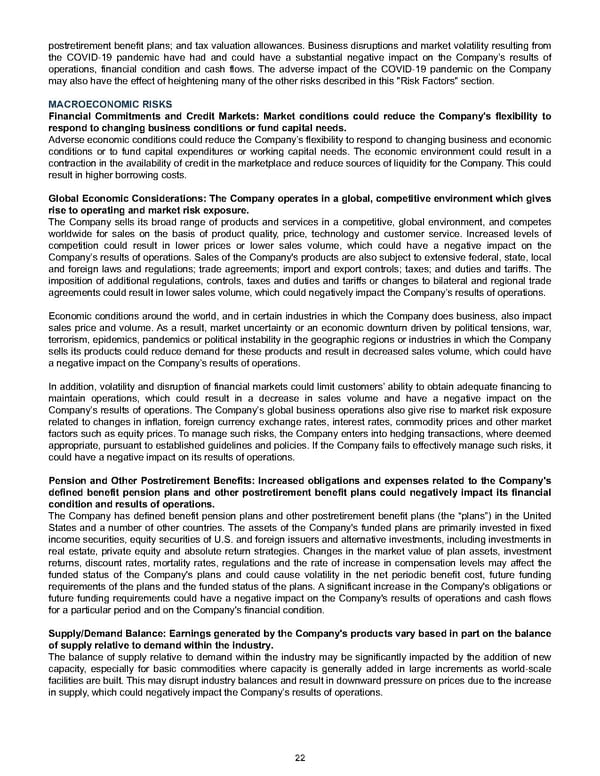postretirement benefit plans; and tax valuation allowances. Business disruptions and market volatility resulting from the COVID-19 pandemic have had and could have a substantial negative impact on the Company’s results of operations, financial condition and cash flows. The adverse impact of the COVID-19 pandemic on the Company may also have the effect of heightening many of the other risks described in this "Risk Factors" section. MACROECONOMIC RISKS Financial Commitments and Credit Markets: Market conditions could reduce the Company's flexibility to respond to changing business conditions or fund capital needs. Adverse economic conditions could reduce the Company’s flexibility to respond to changing business and economic conditions or to fund capital expenditures or working capital needs. The economic environment could result in a contraction in the availability of credit in the marketplace and reduce sources of liquidity for the Company. This could result in higher borrowing costs. Global Economic Considerations: The Company operates in a global, competitive environment which gives rise to operating and market risk exposure. The Company sells its broad range of products and services in a competitive, global environment, and competes worldwide for sales on the basis of product quality, price, technology and customer service. Increased levels of competition could result in lower prices or lower sales volume, which could have a negative impact on the Company’s results of operations. Sales of the Company's products are also subject to extensive federal, state, local and foreign laws and regulations; trade agreements; import and export controls; taxes; and duties and tariffs. The imposition of additional regulations, controls, taxes and duties and tariffs or changes to bilateral and regional trade agreements could result in lower sales volume, which could negatively impact the Company’s results of operations. Economic conditions around the world, and in certain industries in which the Company does business, also impact sales price and volume. As a result, market uncertainty or an economic downturn driven by political tensions, war, terrorism, epidemics, pandemics or political instability in the geographic regions or industries in which the Company sells its products could reduce demand for these products and result in decreased sales volume, which could have a negative impact on the Company’s results of operations. In addition, volatility and disruption of financial markets could limit customers’ ability to obtain adequate financing to maintain operations, which could result in a decrease in sales volume and have a negative impact on the Company’s results of operations. The Company’s global business operations also give rise to market risk exposure related to changes in inflation, foreign currency exchange rates, interest rates, commodity prices and other market factors such as equity prices. To manage such risks, the Company enters into hedging transactions, where deemed appropriate, pursuant to established guidelines and policies. If the Company fails to effectively manage such risks, it could have a negative impact on its results of operations. Pension and Other Postretirement Benefits: Increased obligations and expenses related to the Company's defined benefit pension plans and other postretirement benefit plans could negatively impact its financial condition and results of operations. The Company has defined benefit pension plans and other postretirement benefit plans (the “plans”) in the United States and a number of other countries. The assets of the Company's funded plans are primarily invested in fixed income securities, equity securities of U.S. and foreign issuers and alternative investments, including investments in real estate, private equity and absolute return strategies. Changes in the market value of plan assets, investment returns, discount rates, mortality rates, regulations and the rate of increase in compensation levels may affect the funded status of the Company's plans and could cause volatility in the net periodic benefit cost, future funding requirements of the plans and the funded status of the plans. A significant increase in the Company's obligations or future funding requirements could have a negative impact on the Company's results of operations and cash flows for a particular period and on the Company's financial condition. Supply/Demand Balance: Earnings generated by the Company's products vary based in part on the balance of supply relative to demand within the industry. The balance of supply relative to demand within the industry may be significantly impacted by the addition of new capacity, especially for basic commodities where capacity is generally added in large increments as world-scale facilities are built. This may disrupt industry balances and result in downward pressure on prices due to the increase in supply, which could negatively impact the Company’s results of operations. 22
 Annual Report Page 31 Page 33
Annual Report Page 31 Page 33